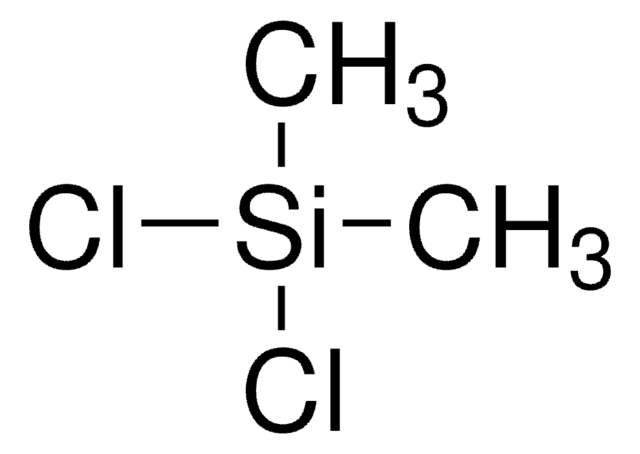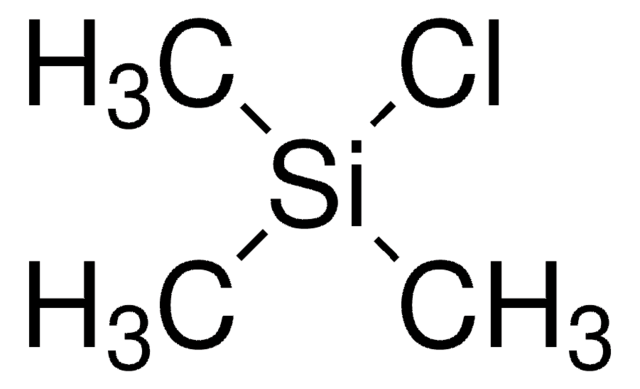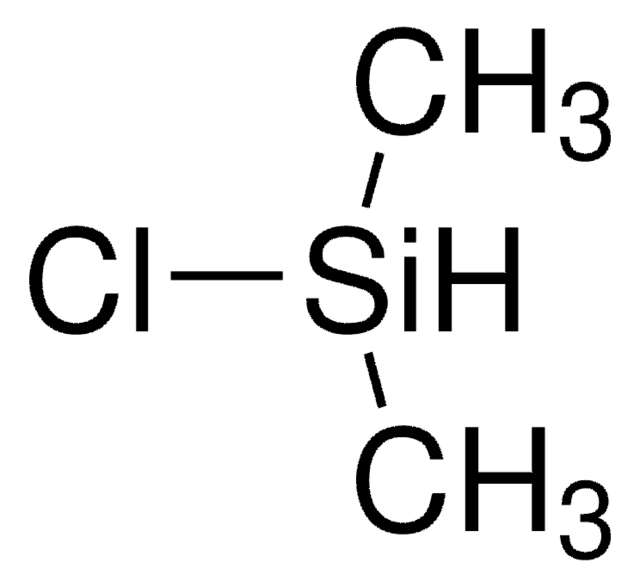8.03452
Dichlorodimethylsilane
for synthesis
Synonym(s):
Dichlorodimethylsilane, Dimethyldichlorosilane
About This Item
Recommended Products
vapor pressure
<200 hPa ( 20 °C)
Quality Level
form
liquid
autoignition temp.
425 °C
potency
6056 mg/kg LD50, oral (Rat)
expl. lim.
1.75-48.5 % (v/v)
bp
70 °C/1013 hPa
mp
-76 °C
transition temp
flash point -5 °C
density
1.07 g/cm3 at 25 °C
storage temp.
2-30°C
InChI
1S/C2H6Cl2Si/c1-5(2,3)4/h1-2H3
InChI key
LIKFHECYJZWXFJ-UHFFFAOYSA-N
Application
- Modification of silica nanoparticles by dichlorodimethylsilane for foam stability and decontamination efficiency: This study explored the surface modification of silica nanoparticles using dichlorodimethylsilane to enhance foam stability and decontamination efficiency (IH Yoon et al., 2016 - kns.org). View Article.
- Formation of a macrocycle from dichlorodimethylsilane and a pyridoxalimine Schiff base ligand: Researchers reported the synthesis of a novel macrocyclic silicon compound through the reaction of dichlorodimethylsilane with a Schiff base ligand (U Böhme et al., 2021 - scripts.iucr.org). View Article.
- Use of Dichlorodimethylsilane to Produce Polydimethylsiloxane as a Substitute for Vitreous Humour: Characteristics and In Vitro Toxicity: This research evaluated polydimethylsiloxane produced from dichlorodimethylsilane as a substitute for vitreous humour in vitreoretinal surgery (DG Auliya et al., 2023 - mdpi.com). View Article.
- Dichlorodimethylsilane mediated one-step synthesis of hydrophilic and hydrophobic silica nanoparticles: The study focused on the use of dichlorodimethylsilane for the one-step synthesis of silica nanoparticles, examining the effects of various synthesis parameters (F Ebrahimi et al., 2017 - Elsevier). View Article.
- Hydrophobization of cotton fabric with silanes with different substituents: This paper explored the hydrophobization of cotton fabric using various silanes, including dichlorodimethylsilane, to enhance fabric properties (T Makowski, 2020 - Springer). View Article.
Signal Word
Danger
Hazard Statements
Precautionary Statements
Hazard Classifications
Acute Tox. 3 Inhalation - Acute Tox. 4 Oral - Eye Dam. 1 - Flam. Liq. 2 - Skin Corr. 1A - STOT SE 3
Target Organs
Respiratory system
Storage Class Code
3 - Flammable liquids
WGK
WGK 1
Flash Point(F)
33.8 °F - closed cup
Flash Point(C)
1 °C - closed cup
Certificates of Analysis (COA)
Search for Certificates of Analysis (COA) by entering the products Lot/Batch Number. Lot and Batch Numbers can be found on a product’s label following the words ‘Lot’ or ‘Batch’.
Already Own This Product?
Find documentation for the products that you have recently purchased in the Document Library.
Our team of scientists has experience in all areas of research including Life Science, Material Science, Chemical Synthesis, Chromatography, Analytical and many others.
Contact Technical Service








